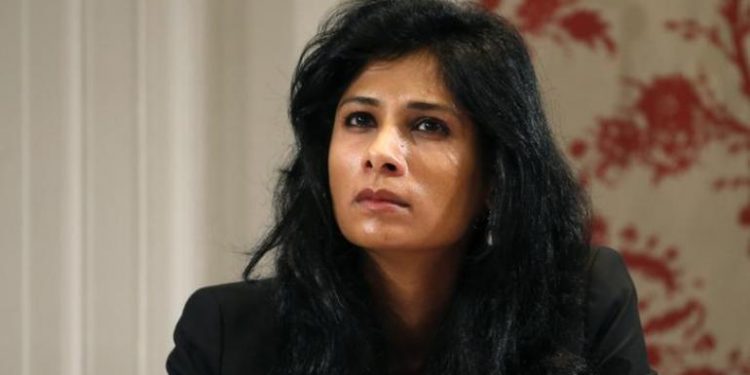Washington: Gita Gopinath, the IMF’s Indian-American chief economist has been promoted as its First Deputy Managing Director, recognising her exceptional intellectual leadership in helping the global economy and the Fund to navigate the “twists and turns” of the “worst economic crisis of our lives”.
Gopinath would replace Geoffrey Okamoto who plans to leave the International Monetary Fund early next year, Kristalina Georgieva, IMF’s Managing Director announced Thursday.
Gopinath, who was scheduled to return to her academic position at Harvard University in January 2022, has decided to stay, she said.
Gopinath, 49, has served as the first female chief economist of the Washington-based global lender for three years.
“Both Geoffrey and Gita are tremendous colleagues — I am sad to see Geoffrey go but, at the same time, I am delighted that Gita has decided to stay and accept the new responsibility of being our First Deputy Managing Director (FDMD),” said Georgieva.
She said Gopinath’s contribution to the Fund’s work has already been exceptional, especially her “intellectual leadership in helping the global economy and the Fund to navigate the twists and turns of the worst economic crisis of our lives.”
She also said Gopinath — the first female chief economist in IMF history — has garnered respect and admiration across member countries and the institution with a proven track record in leading analytically rigorous work on a broad range of issues.
“Especially given that the pandemic has led to an increase in the scale and scope of the macroeconomic challenges facing our member countries, I believe that Gita — universally recognised as one of the world’s leading macroeconomists — has precisely the expertise that we need for the FDMD role at this point. Indeed, her particular skill set — combined with her years of experience at the Fund as Chief Economist — make her uniquely well qualified. She is the right person at the right time,” Georgieva said in a statement.
Under Gopinath’s leadership, the IMF’s Research Department had gone from “strength to strength,” particularly highlighting its contributions in multilateral surveillance via the World Economic Outlook, a new analytical approach to help countries respond to international capital flows (the integrated policy framework). Gopinath’s recent work on a pandemic plan to end the COVID-19 crisis by setting targets to vaccinate the world at feasible cost, said the IMF’s Managing Director.
“I am honoured and humbled to become the IMF’s next FDMD,” Gopinath said on her new appointment.
Gopinath noted that over the past three years she had the opportunity to experience first-hand and be a part of the hugely important work done by the IMF at the intersection of rigorous economic analysis and public policy.
“It has been so gratifying to see the positive impact of our work on economies and on the lives of so many people worldwide. As the pandemic continues its grip on us, the work of the Fund has never been more critical and international cooperation never more important,” she said, and thanked Georgieva and the IMF Board for giving her the opportunity.
Georgieva noted that given the increasingly complex policy choices and difficult trade-offs facing the IMF’s 190 member countries — exacerbated by the pandemic — some realignment in the roles and responsibilities of the Fund’s senior management team is being undertaken.
In particular, the FDMD will take the lead on surveillance and related policies, oversee research and flagship publications and help foster the highest quality standards for IMF publications, she said.







































